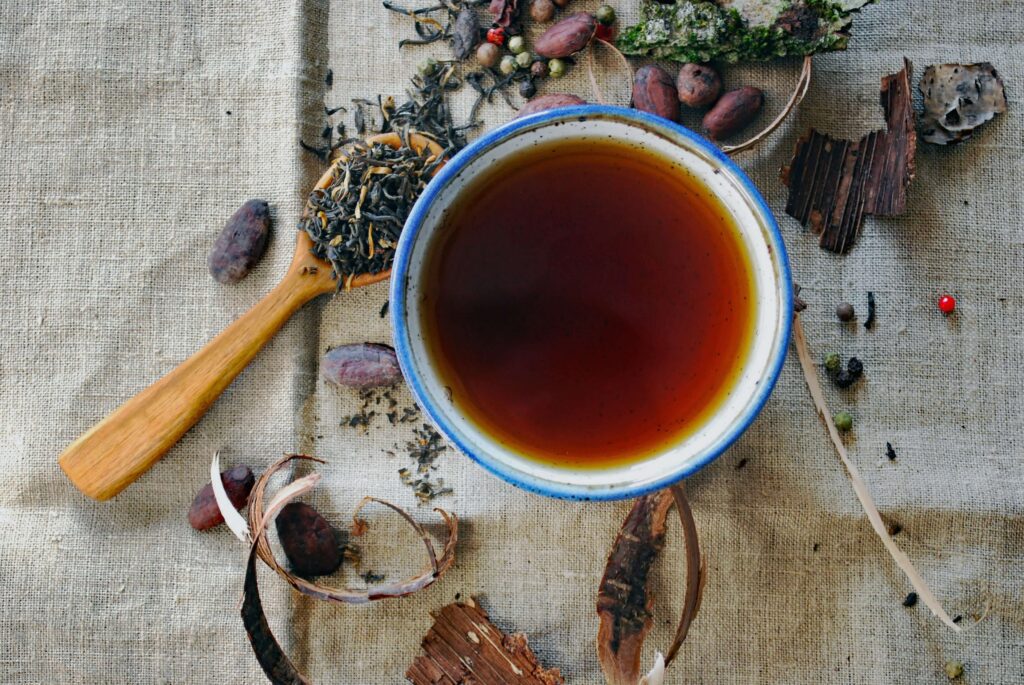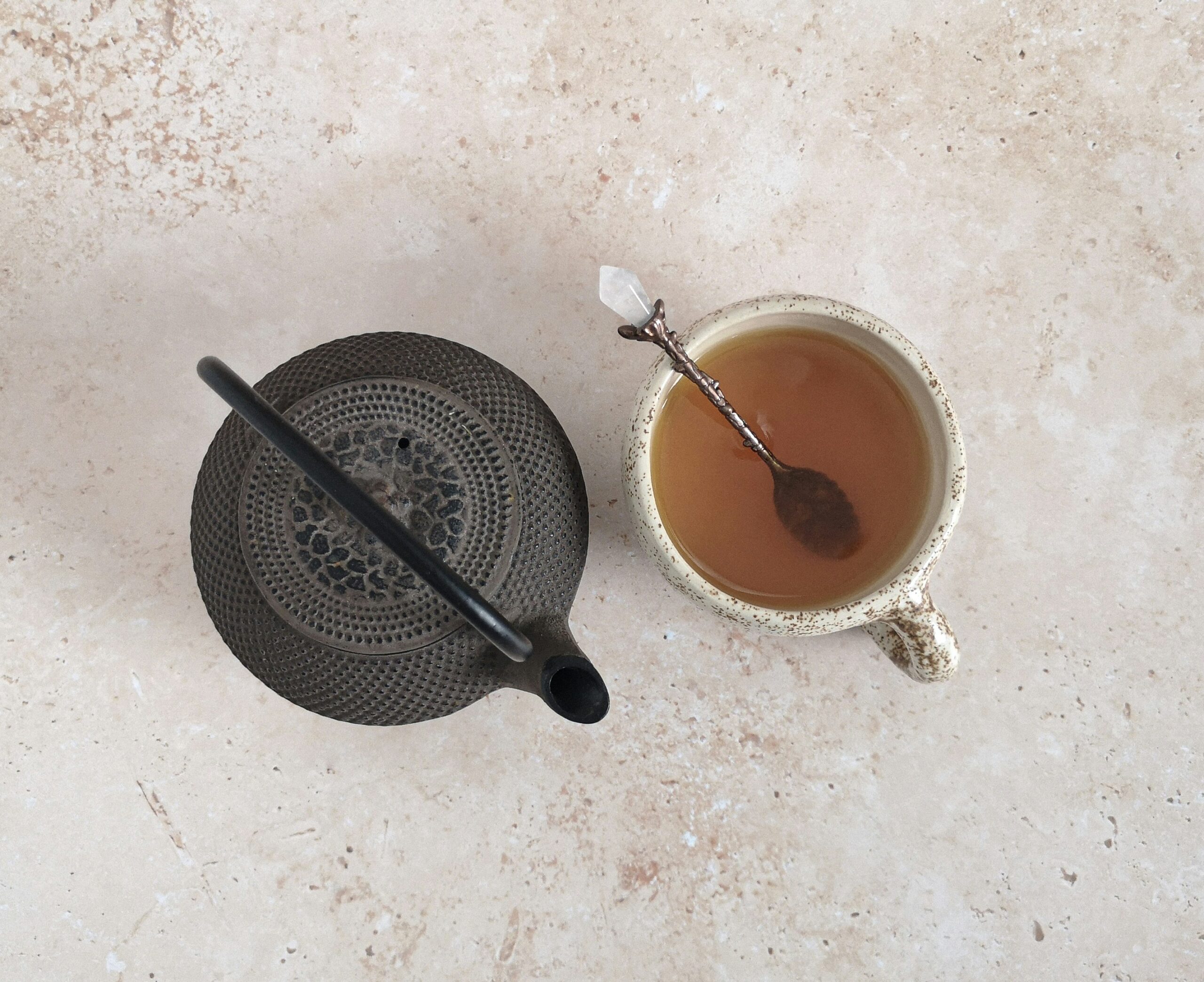
Does Herbal Tea Stain Teeth? In short – yes and no. It depends on what herbal tea you are talking about.
Tea, a beloved beverage enjoyed by many for its diverse flavours and health benefits, has an often-overlooked downside for oral health – the potential for staining effect on teeth … because we all love a brighter smile. Herbal teas, in contrast to traditional black or green teas, are commonly perceived as gentler and a natural alternative, but they may still raise concerns when it comes to your pearly whites, especially if this is part of your daily routine. The discolouration of teeth over time can stem from a variety of dietary choices, and understanding the effect of herbal teas is important.
The likelihood of teeth staining from herbal teas depends on several factors, including the type of herbs used and your individual oral hygiene practices. While some herbal teas may have a lesser staining capability than their black tea counterparts, they can still contribute to surface stains on your dental enamel. It’s essential for you to be mindful of the ingredients in tea blends, such as those containing hibiscus or berried herbs, which can be more prone to leaving stains.
Key Takeaways
- Certain herbal teas have the potential to stain teeth, although they might be less impactful than traditional teas.
- Preventing staining involves good oral hygiene and perhaps adjusting your tea-drinking habits.
- Regular dental care can address any discolouration and maintain oral health.
WHAT ARE WE TALKING ABOUT TODAY?
- Understanding Tea and Tooth Enamel
- Preventative Measures and Daily Habits
- Removal and Whitening Options
- Tea’s Impact on Overall Oral Health
- Frequently Asked Questions
Understanding Tea and Tooth Enamel
When you enjoy a cup of tea, you might not always think about the effect it has on the exposure of your teeth. Tea contains compounds that can affect the colour and health of your tooth enamel.
The Role of Tannins in Tea Stains
Tannins are natural compounds found in various plants, including tea leaves. They have a unique ability to add flavour and colour characteristics of tea. However, the amount of tannins also have the propensity to cause staining on teeth. The darker the tea, such as black tea and even some herbal teas, the higher the tannin content tends to be, which can increase the risk of tea stains adhering to your tooth enamel.
Comparing Herbal and Traditional Teas
When you compare herbal teas to traditional teas like black, green, or white tea, it’s important to note the differences in their effects on your teeth. Herbal teas, generally, have fewer tannins than black tea but can still cause brown stains depending on the specific herbs used. For instance, some herbs like hibiscus are known to have a strong pigmentation that might stain the color of your teeth. In contrast, white tea typically has a much lower amount in tannin levels and is less likely to stain your enamel than black or green tea.
Acidity and Its Effects on Tooth Enamel
All types of tea have some level of acidity, which can weaken tooth enamel over time, making it more prone to staining and other forms of decay. The pH level of tea is important — the lower it is, the more acidic the tea. Herbal teas can vary widely in acidity, so it’s beneficial to be mindful of this when selecting your tea to ensure you’re choosing one that is kinder to your enamel.
RELATED: Herbs For Tooth Decay: Natural Remedies For Dental Health
RELATED: Herbal Antibiotics For Tooth Infection: Natural Relief
Preventative Measures and Daily Habits
To steer clear of tea stains on your teeth, adopt daily habits and preventive measures that maintain your dental health. These strategies range from how you drink your tea to the way you care for your teeth after indulging.
Optimal Brushing and Flossing Techniques
Brushing your teeth effectively is your frontline defence against discolouration. Use a soft-bristled toothbrush and gently brush in a circular motion twice a day for two minutes each session. Decisive yet gentle flossing at least once daily will help remove tea particles from between your teeth, thwarting potential stubborn stains and maintaining gum health.
Dietary Choices and Alternatives
Being selective with your diet can vastly influence tooth staining. Drinking herbal teas that have a lighter colour can lessen the risk of discolouration. If your preference leans towards darker teas, consider incorporating dairy or a non-dairy milk alternative which can help reduce staining by neutralising some of the tea’s acidity.
The Benefits of Using a Straw
Employing a straw can significantly ward off stains by reducing the contact between the tea and your teeth. If you choose to use a straw, aim to place it towards the back of your mouth. Doing so allows the tea to bypass your teeth more effectively, hence minimising the chance of stains. Remember to opt for a reusable straw to care for your oral hygiene while being environmentally responsible. After enjoying your tea, rinsing your mouth with water can help to wash away residual tannins that may cause stains.
Removal and Whitening Options
When it comes to removing tea stains from your teeth, you have a variety of options ranging from at-home remedies to professional treatments. These can help you maintain a brilliant smile without forgoing your favourite cuppa.
Home Remedies for Tea Stain Removal
Your pantry may already hold simple solutions to lighten tea stains. Baking soda has mild abrasive properties which can help scrub away surface stains on teeth. To use, simply mix a small amount of baking soda with water to create a paste and gently brush your teeth. Be mindful, excessive use can damage enamel.
Professional Teeth Whitening Solutions
For more stubborn tea stains or a quicker transformation, professional teeth whitening is a popular option. Dental clinics offer treatments like laser whitening or custom-fitted bleaching trays, which can provide noticeable results in just one visit. Bear in mind, these solutions may result in higher sensitivity for a short period post-treatment.
Choosing the Right Whitening Toothpaste
Selecting a whitening toothpaste that’s right for you is vital for daily maintenance and stain removal. Look for toothpastes with active ingredients known to remove tea stains, such as green tea extracts or Salvadora persica. These natural extracts have shown potential in improving dental brightness. Additionally, teeth whitening strips are a convenient at-home whitening option that you can use to gradually lighten your teeth over time.
Tea’s Impact on Overall Oral Health
When you enjoy a cup of tea, you’re not just comforting your soul; you might also be providing some benefits to your oral health. However, it’s important to understand how tea can both positively and negatively affect your mouth’s wellbeing.
Balancing Oral Hygiene and Tea Consumption
Your love for tea could be contributing to tea staining on your teeth, especially if you’re a fan of darker varieties. While black tea is notorious for this, green tea may cause less discolouration. Which is some of the benefits of green tea over other teas. To help mitigate staining, maintain strict oral care habits such as brushing and flossing on a regular basis after your tea indulgence. Swishing your mouth with water post-tea can also help. Remember, the key here is balance; enjoying your tea while preserving your brilliant smile.
Health Benefits Beyond the Smile
The perks of sipping on tea extend well beyond just the appearance of your teeth. Tea contains compounds that can contribute to oral health benefits like reducing bacteria, which in turn can minimise plaque formation and gingivitis. These properties make your cuppa a potent ally for your oral hygiene routine. Try peppermint tea for good measure!
Peppermint tea offers several benefits for oral health, thanks to its natural properties:
- Antibacterial properties: Peppermint contains antibacterial compounds, which can help combat harmful bacteria in the mouth. This can contribute to fresher breath and a cleaner oral environment, reducing the risk of oral infections and cavities.
- Reduces bad breath: Peppermint’s refreshing scent and flavor can help mask bad breath temporarily. Additionally, its antibacterial properties can target the underlying causes of bad breath, such as oral bacteria.
- Anti-inflammatory effects: Peppermint has anti-inflammatory properties that can help soothe gum inflammation and reduce swelling. This can be beneficial for individuals with gingivitis or other gum problems.
- Pain relief: Peppermint has a cooling effect that can help alleviate minor oral pain, such as toothaches or sore gums. It can provide temporary relief until proper dental treatment is sought.
- Improved digestion: While not directly related to oral health, peppermint tea can aid digestion. Better digestion can indirectly benefit oral health by reducing the likelihood of acid reflux, which can contribute to tooth erosion and gum problems.
- Natural remedy: Peppermint tea is a natural and gentle option for promoting oral health compared to some commercial mouthwashes or oral care products that may contain artificial ingredients or alcohol, which can be harsh on the mouth.
Oolong tea, like peppermint tea, offers several potential benefits for oral health:
- Polyphenols: Oolong tea contains polyphenols, which are antioxidants known for their ability to fight against harmful bacteria in the mouth. These polyphenols can help reduce the formation of plaque and lower the risk of dental caries (cavities).
- Fluoride: Some oolong teas may naturally contain fluoride, a mineral known for its role in preventing tooth decay. Fluoride helps strengthen tooth enamel, making it more resistant to acid attacks from bacteria and acidic foods.
- Antibacterial properties: Similar to peppermint tea, oolong tea also possesses antibacterial properties that can help inhibit the growth of bacteria in the mouth, thus promoting fresher breath and a healthier oral environment.
- Reduced acidity: Oolong tea is less acidic compared to some other beverages like coffee or fruit juices. Consuming less acidic beverages can help protect tooth enamel from erosion, preserving dental health.
- Anti-inflammatory effects: Some research suggests that oolong tea may have anti-inflammatory properties, which can help reduce inflammation in the gums and alleviate symptoms of gum disease, such as swelling and bleeding.
- Hydration: Staying hydrated is essential for maintaining good oral health. Drinking oolong tea, like any other non-sugary beverage, can help keep the mouth moist and wash away food particles and bacteria, reducing the risk of plaque buildup and cavities.
While oolong tea can contribute to oral health, it’s important to consume it in moderation and as part of a comprehensive oral hygiene routine. Regular brushing, flossing, and dental check-ups remain crucial for maintaining healthy teeth and gums. Additionally, be mindful of adding sugar or acidic additives to your tea, as these can negate some of the benefits and potentially harm your oral health.
Ensuring that you pair your tea habit with a steadfast oral care regimen will allow you to relish in tea’s health advantages without compromising the health of your teeth and gums the next time you want to enjoy a cuppa.
Frequently Asked Questions
Exploring the impact of herbal tea on your teeth’s colouring, you’ll uncover useful tips for enjoying your favorite brew without worries about tooth stains.
Can herbal tea lead to discolouration of the teeth?
Yes, herbal tea can lead to discolouration of your teeth. This is often due to tannins found in teas that can contribute to the build-up of surface stains on your enamel.
How can you naturally get rid of tea stains on your teeth?
To naturally rid your teeth of tea stains, consider brushing with a baking soda and hydrogen peroxide paste, or try crunchy fruits and vegetables that can rub away mild stains gently.
Is there a way to enjoy tea without staining your teeth?
Certainly! Rinse your mouth with water after having tea or drink through a straw to minimise contact with your teeth. Opting for teas with lower tannin levels can also help you enjoy tea without worrying about stains.
Does chamomile tea and other herbal teas affect the whiteness of your teeth?
Chamomile and other lighter-coloured herbal teas generally have lower staining potential. However, they can still affect the whiteness of your teeth over time but to a lesser extent than darker teas and coffee.
RELATED: Is Chamomile Tea Effective For Acid Reflux Relief?
RELATED: Best Chamomile Tea: A Gentle Path To Wellness
Are there specific teas that are less likely to stain your teeth?
White and green teas are typically less likely to stain your teeth than black or herbal teas with strong pigments, as they contain lower amounts of stain-promoting tannins.
How does the staining potential of herbal tea compare to coffee?
Herbal tea typically has a lower staining potential than coffee. The darker the tea, the higher the potential for staining, similar to how darker roasts of coffee might stain your teeth more significantly.



Comments +